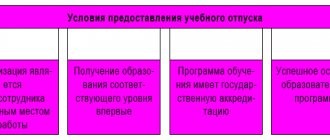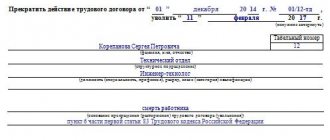Author of the article: Vladimir Danilevsky Last modified: January 2020 15029
Leave due to the death of a relative is a necessity for a citizen who has lost a loved one. During this time, you need to do a lot of important things, say goodbye to your loved ones and put your thoughts in order before going to work. For an employer, providing days is not a right, but an obligation established by the Labor Code of the Russian Federation. Despite the clear regulation of the procedure, in practice conflicts still occur between the parties. Often the court intervenes in the matter. The article will describe in detail the nuances of providing leave in connection with the death of an employee’s relative, as well as issues that can be agreed upon by the employee and the employer.
How much time off do you give for the funeral of a close relative?
According to Russian labor legislation, the maximum duration of leave granted for a funeral is five days. The employee has the right to write a statement both for this entire period and for part of it, for example, for three days. In this option, the remaining weekends are burned out and cannot be used for other purposes.
If a citizen needs more time, in particular to travel to another region, then he should negotiate with the employer individually. The state guarantee is five days; a longer period can be provided by management, but management is not obliged to do this.
Clarifying which relatives are given 3 days for the funeral, we note that these are people with direct blood ties, as well as those equated to them under the Family Code. One of the basic conditions is the ability to prove proximity in documents, for example, through a birth certificate or marriage certificate. In some cases, relationship is more difficult to show.
When time off is requested for the funeral of a person who is not a close relative, the employer has every reason to refuse.
What is the length of leave for a funeral?
According to the Labor Code of the Russian Federation, in the event of the death of a close relative, any employee can receive up to 5 free days at his own expense.
If necessary, this leave can be extended to 14 days, but only by agreement with the employer.
However, the decision to renew is solely the responsibility of the organization. Many employees take 3 days off for funerals: during this time they can complete all matters related to the funeral and lose less financially. In addition, until recently, many government organizations paid three days of funeral leave to their employees, but today this practice is gradually becoming a thing of the past. Now, in each individual case, the period of leave for a funeral is negotiated individually. Some people want to spend more time with their families, while others simply have no one to replace them at work. As a result, he has to be torn between work and mourning procedures. Do not forget that additional conditions for granting leave for these days may be specified in a local regulatory act (hereinafter referred to as LNA) or the collective agreement of the enterprise, if any. These documents can regulate both the vacation period, which the company can increase (but not decrease, which is contrary to labor protection conditions), and other nuances associated with it. For example, such a document may indicate the possibility of an employee receiving 3-5 days of paid funeral leave in the event of the death of a family member, or guaranteed time off for a day if a close friend dies.
If the employee is not given leave for a funeral or is severely shortened (they are given less than 5 days guaranteed by law), the employee has the right to contact the Investigative Committee at the place of residence or the prosecutor’s office with a statement of violation.
Who is considered a close relative?
The Labor Code does not contain a list of persons who belong to the category of close relatives; in this regard, you need to focus on family law. In accordance with Articles 2 and 14 of this code, the list of close relatives is quite wide. It includes not only people with whom there is a marital relationship, but also children, parents, grandchildren, grandparents, and siblings.
Blood connection is not the only criterion for determining the degree of relationship; if a child has been officially adopted, then he has equal rights with those born. But if a man and a woman cohabited but were not married, then they are not considered relatives even if they have children together and maintain a common household.
Half-siblings are also recognized as close relatives. The main condition is the presence of a common parent by blood or law.
How to take a vacation or time off
The procedure for applying for days off due to the death of a relative is similar to the standard process for taking leave. First of all, the employee must express his desire by submitting an application addressed to his immediate supervisor. Next, based on the received paper, the boss makes a decision on granting days of rest. If the decision is positive, an appropriate order is issued.
Leave for the funeral of a close relative Art. 128 must be drawn up in accordance with all the norms of modern legislation. This rule applies to all types of time off, even days assigned for family reasons without a good reason.
Foundation documents
According to the law, when submitting an application, you do not need to attach any documents, that is, the application itself is enough. Some people immediately attach the death certificate, which is not a required step. However, the employer has the right to request two papers from the employee:
- death certificate of a relative;
- confirmation of relationship.
The employee can provide both materials after the funeral. Please note that refusal to bring them may become a reason for registering missed days as absenteeism. Difficulties, as a rule, arise with the second document, since it is possible to prove closeness with a sister only through two birth certificates, and in old age these materials can be lost long ago. The way out of the situation is to contact the registry office, where the certificates were issued.
If days off are not provided according to the article, but at the personal request of the employee, then the demand for documents is illegal. Having accepted the application, the employer agreed to leave without a compelling argument.
Statement required upon death of a relative
As noted above, leave will only be granted if the employee submits an application. There is no single sample of such a document, that is, it is written in free form. The main thing is that all the basic elements are there:
- personal information and positions of the sender and recipient;
- directly requesting a day off;
- the number of days off is equal to or less than five;
- employee signature and date of application.
Also sometimes reference is made to a legal act giving the right to this vacation. It is Article 128 of the Labor Code of the Russian Federation. It also indicates other reasons for providing unscheduled unfunded leave - the birth of a child for men and the official registration of marriage.
Sample application
An application for leave due to the death of a close relative may look like this:
To the Director of Romashka LLC
Ivanov I.I.
From an engineer
Petrova P.P.
Statement
In connection with the death of Petrov’s brother I.P. I request that you be granted leave without pay based on Article 128 of the Labor Code of the Russian Federation for a duration of five days from 11/20/19.
Signature
The company may have an approved sample application. If this is the case, you should use a special form. It is attached to the company's internal documents.
How many times can it be given
According to Russian law, there are three types of leave, assigned without pay, lasting up to five days:
- for marriage in the registry office;
- at the birth of a child;
- for the funeral of a close relative.
Weekends are assigned an unlimited number of times a year on each occasion. You cannot take time off for one event more than once. But if an employee had a wedding, the birth of two children and the funeral of three relatives within the year, then he could take 6 vacations. Refusal to provide it on the basis that the person has already used time off for another event is unlawful.
Reflection in the time sheet
Any vacation, even lasting one day, must be officially registered. This process involves issuing an order and recording information in a time sheet.
The time sheet is the main document on the basis of which an employee’s salary is calculated, so it is important that time off is marked as days of absence without compensation. Depending on the form adopted by the company, either 17 or OZ is written.
Days off provided for funerals are not reflected in the vacation schedule, as they do not affect it. This document specifies only paid periods of absence from work.
Are days paid for the funeral of a loved one?
Based on the Labor Code, financial compensation is not awarded for the period of leave due to the death of a close relative. In the application itself, the employee indicates that he is asking for days without pay.
Some companies accept cash payments in such situations. This is recorded in the company’s internal documents and may be duplicated in the employment contract. In particular, some companies provide benefits only upon the death of certain relatives: mother, father or child. But the employee must be released to attend the funeral of all people classified as close relatives.
Taxation
Personal Personal Income TaxFinancial support from an organization to an employee in connection with the death of a family member is not subject to income tax. This is how clause 8 of Art. 217 Tax Code of the Russian Federation. Please note: we are talking about spouses, children and parents only!
If another relative dies, tax is not paid only in the case of joint residence (documentary evidence will be required).
https://youtu.be/RwZLI0K1yRY
Insurance premiumsAccording to Law No. 212-FZ, financial assistance is not subject to insurance premiums. However, it is prohibited to expand the concept of “family member”. For example, when paying money in connection with the death of a grandfather, it is advisable to pay contributions from it. Otherwise, be prepared to argue. There are chances.
Allowance for funeral services
Not many people know that in the Russian Federation, as a social state, compensation is paid for funeral services. Relatives directly involved in organizing the funeral are entitled to receive a sum of money. In 2020, the payment amount starts from 5,900 rubles; in a number of regions where there is an increasing coefficient, the benefit is larger.
In addition to the above payment, a number of enterprises provide special compensation for the death of a close relative. This rule is fixed in the collective agreement and applies to all officially employed employees. The amount of the benefit is determined by the employer. Actual funeral costs are not taken into account in this case.
You can receive benefits to pay for funeral services at the place of employment of a deceased relative; if he did not work, then at the Pension Fund of the Russian Federation or social security.
Duration
The current legislation determines the duration of leave of this nature.
A person can claim up to five actual days.
That is, in this case, an upper limit on the duration is set. In practice, most often workers are given three days under the labor code. The regulation of vacation dates occurs because the general standards do not directly say how many days the head of the company should give a person.
Only the maximum duration is defined. In each specific case, everything is decided individually based on the prevailing circumstances. Various factors are taken into account. The main one is the remoteness of the place of actual residence of the deceased. If the distance is quite long, it may take a long time for a person to leave and return.
Collective agreements of almost all organizations indicate the specific duration of vacation in days, for example, from one to five. It would be correct to reflect the maximum established by law. Otherwise, the employee may have a reason to file a complaint with the authorized authorities.
What threatens an employer who does not allow an employee to take leave due to a funeral?
Refusal to grant leave assigned on the basis of Article 128 of the Labor Code of the Russian Federation threatens the company management with a financial fine. The amount of payment is determined by the Administrative Code. A sanction is imposed either as a result of the discovery of an offense during a routine inspection, or on the basis of an employee’s complaint to the labor inspectorate.
The employer has the right to provide leave for the funeral not only of a close relative, but also of any person at the request of the employee, but is not obliged to do this. Please note that days off are given solely at the request of the employee; the employee must initiate time off.
The fact that 3 days are provided for a funeral according to the Labor Code is not described by Article 173. It states that a person combining study and work has the right to go on unpaid leave for the period of admission, examination, and writing a thesis. When submitting an application for a weekend in connection with the death of a relative, you must refer to Article 128 of the Labor Code of the Russian Federation.
In what cases can you get vacation at your own expense?
Article 128 of the Labor Code of the Russian Federation guarantees the employee’s right to receive extraordinary days off. Typically, additional leave is granted at the request of the employee on the terms agreed upon by the parties. As a rule, we are talking about leave without pay. The duration of the period is set individually, but at the same time this fact should not violate the rights of the employee, confirmed by law.
The total total number of additional calendar days per year can, at the request of the employee, reach different indicators. For family reasons (birth of a child, marriage, death of loved ones) up to 5 days off are provided.
Funeral leave for military personnel
Military personnel are a special category of citizens who are not subject to all the laws and regulations that apply to civilians. But with regard to leave for the funeral of a close relative, they have even more attractive conditions. Contract and conscript military personnel are provided with up to ten days of rest in the event of the death or serious illness of a close relative. This status of a person is also determined by the family code.
Please note that the duration of the vacation can be increased if more travel time is needed. Conscripts and cadets are also provided with payment for travel to and from home if they wish to take advantage of compensation for this leave. The payment can be assigned for one vacation per year, with the exception of vacation vacations.
Labor legislation is a balance between the interests of the employee and the employer. If an employee needs additional days off in connection with the funeral of a close relative, then he has the right to take leave at his own expense. Management cannot refuse this leave, even if the request is submitted unexpectedly and it is difficult to find a replacement for the employee. Summarizing the maximum number of days allowed for the funeral of a close relative, let us clarify that we are talking about five days, but you can take less.
Nuances of legislation
Let’s say that due to a tragic incident with a loved one, an employee needed to take several days off.
He has the right on the basis of Art. 128 of the Labor Code of the Russian Federation to take leave without pay, but you need to know some nuances. Also see “Unpaid Leave.”
Unfortunately, labor legislation does not specify the concept of “close relatives” required to receive unpaid leave. Therefore, we must be guided by Art. 14 of the Family Code. She refers to such people as:
- husband/wife;
- parents (natural and adopted);
- children (natural and adopted);
- grandparents;
- grandchildren;
- full brothers and sisters (have common parents);
- not full brothers and sisters (they have a common father or mother).
Note that the head of any enterprise has the right to increase the given list. The main thing is to indicate new positions in the company’s internal rules. After all, many details are not regulated by law. At the same time, reduce the list from Art. 14 of the RF IC – unacceptable.
Thus, if the person who has passed away is not such a relative, then taking leave in connection with the funeral is not necessary. The employer makes the decision at his own discretion.
The second nuance that you need to know about is the absence of the concepts of “vacation” or “time off” at the legislative level. And they are necessary for the correct completion of all formalities.
Please note: if an employee previously worked on a weekend or holiday, he is entitled to a day of rest, which can be taken along with other reasons for temporary absence from the workplace.











